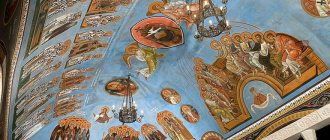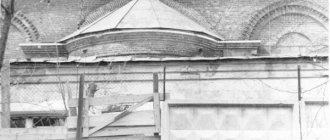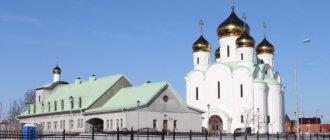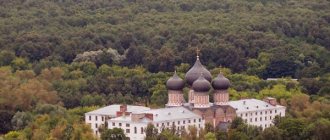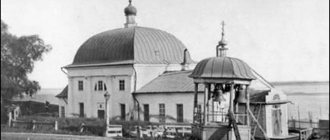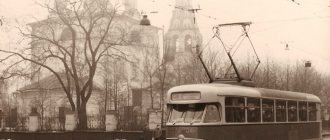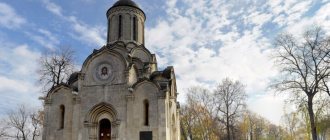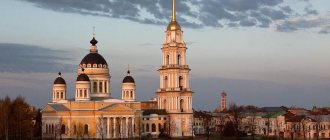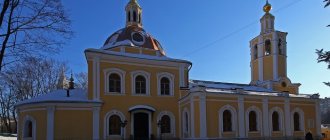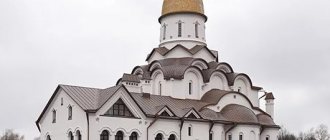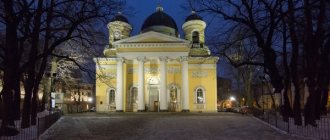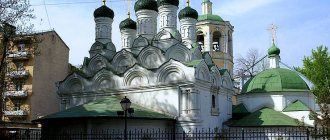How to get there?
Ways to get to the temple by public transport:
| Point of departure | Directions description | Approximate travel time |
| Ozernaya metro station (Kalininsko-Solntsevskaya line) | Take bus “807” from the “Ozernaya” metro stop and go 4 stops to “Ulitsa Generala Dorokhov”. Walk to the temple gate for 1 minute. | 20 minutes. |
| Take bus “610” from the “Ozernaya” metro stop and go 3 stops to “Service Industry College No. 44”. Then walk along General Dorokhov Street for 2 minutes. to the temple gates. | 20 minutes. | |
| Kuntsevskaya metro station (Arbatsko-Pokrovskaya line) | Exit the metro, the last car from or minibus “498” (follows route “11”) go to “Ochakovskoye Shosse, building 16”. Walk for about 5 minutes. along Stroykombinat Avenue , then turn left onto General Dorokhov Street and walk 2 minutes. to the temple gate | 25-30 min. |
| Yugo-Zapadnaya metro station (Sokolnicheskaya line) | Take bus 610 from the Yugo-Zapadnaya Metro stop for 8 stops to Service Industry College No. 44. Then walk along General Dorokhov Street for 2 minutes . to the temple gates. | 35-40 min. |
| Platform "Ochakovo" | From the Ochakovo platform of the Kyiv direction, go along the Stroykombinat passage, cross the Ochakovskoe highway, then stubbornly follow the designed passage, turn left onto General Dorokhov Street. | 20-25 min. |
Story
The Church of St. Demetrius was founded by a statesman of that time, Major General and Privy Councilor Mikhail Stepanovich Opochinin in 1757. Being the owner of the village of Ochakovo, on May 5 he turned to the Synod with a request to give permission to build a church in the name of the recently canonized Saint and Wonderworker Demetrius of Rostov.
A positive decision came immediately: the blessed letter for the construction of the temple was given in the same month by Decree of Empress Elizabeth Petrovna.
Initially, it was planned to build a wooden house church, but by coincidence, construction began with white stone, which allowed this building to survive to this day. The construction work was completed in 1761, after which the temple was illuminated.
The Church of Demetrius of Rostov in Ochakovo escaped significant damage during the French invasion during the War of 1812. In 1855, the daughter of the former owner of the village of Ochakovo, Lieutenant Colonel N.G. Golovin, transferred the land on which the temple is located, as well as the surrounding territory, for use.
In 1897, a complex and unique for that time spiritual heating system was installed in the temple.
The period of the 1917 revolution became unfavorable for the temple: it was closed in the mid-20s, church valuables were partially confiscated, and the building was transferred “for free use” as a warehouse for storing grain and vegetables. After the events mentioned, for some time believers were given the opportunity to participate in divine services, but in 1930 the temple was closed again.
After the shocks suffered , restoration work in the temple, planned for 1960, began only in 1972. Years of persecution of the church did not leave the temple with its former church shrines and decorations, so it takes quite a lot of time to revive the former appearance of the dilapidated building.
In 1992, the restoration of the temple was successfully completed by the forces of state workshops, after which the official return of the temple to the Church and believers took place. Archpriest Dimitry Ivanov was appointed rector of the temple even before the resumption of work.
It was he, together with the parishioners, who completed the preparation of the church for the opening.
Through joint efforts, the interior of the temple was repaired (the floor, windows, doors were made), utensils were purchased, the Throne and Altar were made in the Danilovsky Monastery, and a wooden iconostasis was built. All this work was carried out with the help of Orthodox patrons and donors.
Temple in Ochakov: history
Now Ochakovo is one of the districts in the south-west of Moscow - not far from Michurinsky Avenue. Nearby is the platform of the same name of the Kyiv direction of the railway.
But once upon a time Ochakovo was a large village in which there were two churches and which passed from one owner to another - many times.
In Soviet times, of the two churches, only this one survived: Demetrius of Rostov. It was built in 1759.
The communists closed it, and there was a vegetable warehouse:
The church in Ochakovo was reopened, like most churches in the country, in the early 90s. By this time, this part of the area - General Dorokhov Street - had long ceased to be a residential area. Factories, warehouses. Many residents of Ochakovo (“on the other side of the railroad”) did not even know that there was a temple next to them. And in the 90s and 2000s, everyone went to the Church of the Archangel Michael - which is located much further, near the Yugo-Zapadnaya metro station, and which, as it was believed, was the only one in the entire endless residential district.
Here she is:
But no - it turns out that much closer, right in Ochakovo, there is also a church:
Quiet area.
Friday morning, Lent. Service. Weekday. But there are parishioners in the church! In many busier areas, not as many people come to the temple on weekdays:
Who are these people, where did they come from, if there is not a house around for a kilometer? A woman in a church shop at a church says: “Residents of Ochakovo go to church. We have very good priests.”
By the way, here is the house where the shop is located:
A small area near the Church of Demetrius of Rostov. The house is also pre-revolutionary:
Territory guard:
Suitable, checks:
An island of silence and life in the middle of roads and industrial buildings.
In the spring, the foliage somehow covers the pipes of the thermal power plant, but in winter and early spring they are clearly visible:
The temple itself can also be seen from the outside. There will be green foliage here in the spring:
And if you stand behind the temple, it seems that you are in the village
